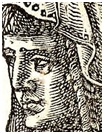|
 |
|
 |
|
|
||
Muhammad - Philosophy, Ethics and Leadership
Muhammad (570-632)
Born in Mecca, now in Saudi Arabia, and founder of the religion of Islam (meaning peace and obedience to God or Allah), whose followers are called Muslims. Muhammad was a successful general and politician, and then a great teacher and preacher to whom God spoke through the angel Gabriel (pictured right above in Rashid-al-Din Hamadani's 1307 painting). His kindness and tolerance contrast strongly with the violence of Islamic terrorists.
His most famous book is... The Qur’an - Islam’s holy book, which contains Muhammad’s teachings
Why was he a great leader? 1. Charm He won people’s hearts with his
2. Tough but kind He had the courage to:
Like Jesus, he was persecuted for his views, but forgave his persecutors. “Guide them on the right path, God, for they know not what they do”, he said ( as Jesus did similarly).
3. Servant leader Muhammad:
4. Integrity and wisdom His life’s teaching is summed up in the Qu’ran: “promote good and prevent evil”. His example inspired all his followers to be good. Muhammad:
5. Reflection and meditation He reflected and prayed a lot about:
One day around 610, having given up a successful business career, he was praying in a cave on Mount Hira, near Mecca. Muslims believe God spoke to him through the angel Gabriel. God gave him the name “Messenger of God”. This event is celebrated by the Islamic festival of Ramadan. 6. Tolerance and open-mindedness He accepted and respected other religions like Judaism and Christianity. Moses, Jesus (pictured right in Dirk Bouts' painting from c 1470-75)., Abraham and Adam are all God’s prophets in Islam. “Unto you your religion and unto me my religion”, he said.
7. Moral leadership He defeated his enemies with great skill, once successfully defending a city by digging a trench around it. But he was kind to them in victory, never destroying their land and always releasing prisoners. He taught jihad, justifying holy war against wrongful aggressors. But there is another type of jihad that Muhammad said was more effective, based on passive, spiritual resistance. This:
8. Support He had a wonderful wife, Khadijah (pictured right on a sixteenth century medal), who became the first convert to Islam. Their happy marriage gave him emotional stability after the trauma of being orphaned aged six.
Key quotes on ethics None of you truly believes until you wish for others what you wish for yourself None of you has faith until you love for your neighbour what you love for yourself. Righteousness is good morality, and wrongdoing is that...which you dislike people finding out about. To overcome evil with good is good, to resist evil by evil is evil.
Key quote on money The best richness is the richness of the soul.
Key quotes on God and religion Unto you your religion and unto me my religion. God is gentle and he loves gentleness in everything. Do you know the thing which most commonly brings people into paradise? It is fear of God and good character.
Key quotes on love Whoever is not merciful to others will not be treated mercifully. The best among you is the best towards people.
Key quote on leadership It s better for a leader to make a mistake in forgiving than to make a mistake in punishing.
Key quote on human resource management Even as the fingers of the two hands are equal, so are human beings equal to one another. No one has any right, nor any preference, to claim another. You are brothers.
|
|
|
||
|
|
||
| Copyright © wisdomtowin.com 2025 All Rights Reserved | ||
|










